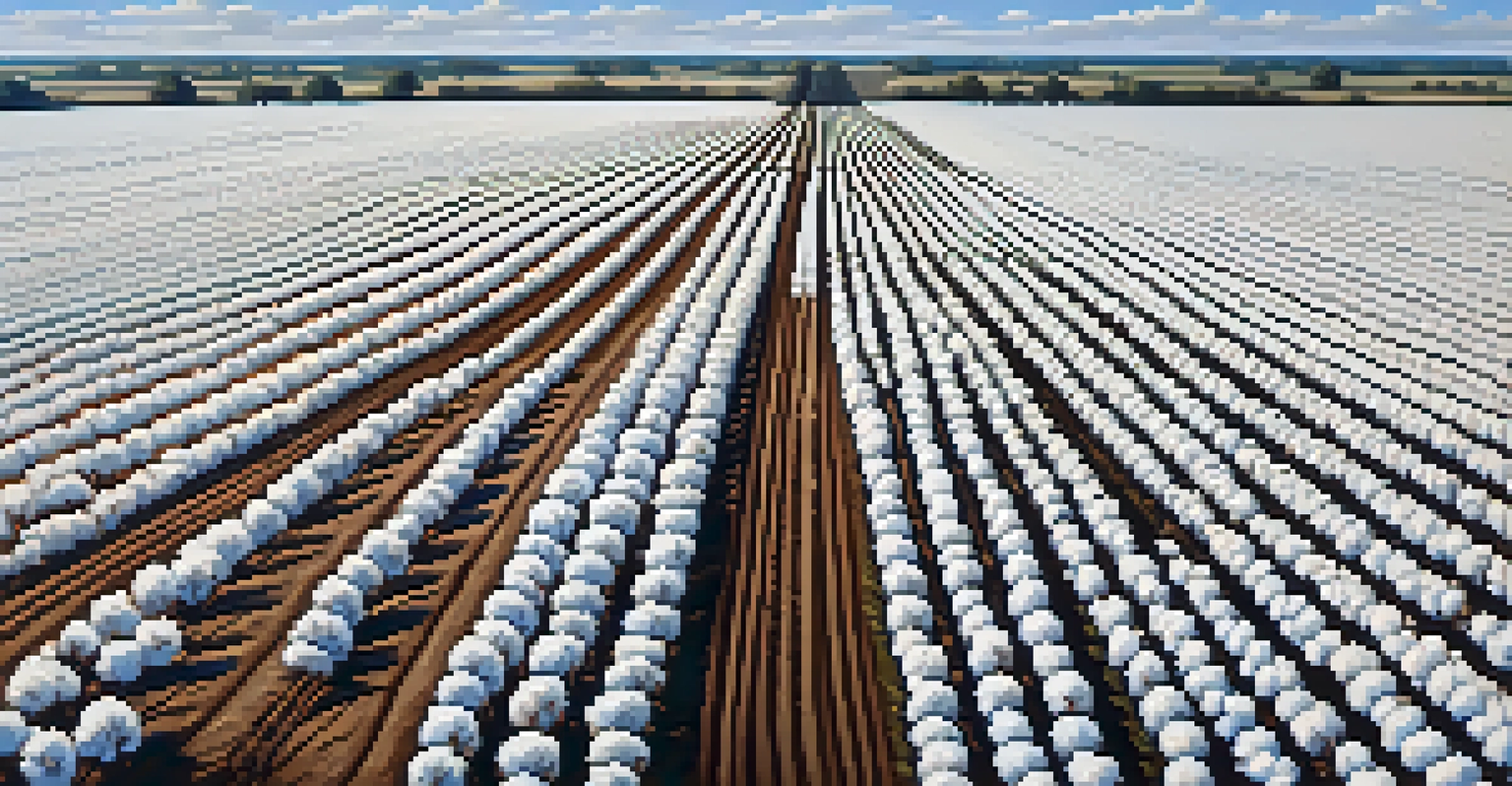Agriculture in Texas: A Pillar of Economic Stability

Texas Agriculture: A Historical Overview and Its Impact
Agriculture has deep roots in Texas, dating back to the early settlers who relied on farming for sustenance. The state's diverse climate and vast land have allowed various crops and livestock to thrive, making it a cornerstone of Texas culture and economy. Over the years, Texas has evolved into one of the nation's leading agricultural states, influencing both local and national markets.
Agriculture is the foundation of our economy, and it provides the most basic necessity of life: food.
The impact of agriculture in Texas extends beyond just food production; it shapes communities and provides jobs for millions. For instance, the cattle industry alone has created a significant number of jobs, supporting ranchers and workers in related fields. This economic activity fosters a sense of community, as families often engage in farming practices passed down through generations.
Looking back, the evolution of Texas agriculture showcases resilience and adaptability, reflecting the spirit of its people. From the cotton boom to modern-day innovations in technology and sustainability, Texas farmers and ranchers have continually adapted to meet challenges. This rich history lays a strong foundation for the future of agriculture in the state.
Key Agricultural Products That Drive Texas' Economy
Texas is a powerhouse in agricultural production, leading the nation in several key commodities. Cattle ranching, cotton production, and poultry farming stand out as major contributors to the state’s economy. Each of these sectors not only provides food and materials but also plays a critical role in supporting local and national supply chains.

For example, the Texas cattle industry is the largest in the United States, accounting for a substantial percentage of the nation's beef supply. This not only fuels the economy but also creates a unique cultural identity for the state, with ranching traditions deeply embedded in Texan life. Additionally, Texas cotton is renowned worldwide, making it essential for the textile industry.
Texas Agriculture's Economic Impact
Texas agriculture significantly contributes to both local and national economies through diverse products and job creation.
The diversity of crops and livestock in Texas ensures that the agricultural sector remains robust and resilient. With the ongoing demand for sustainable practices, Texas farmers are also embracing innovative techniques to produce food efficiently. This versatility in agricultural products is a testament to the state's role as an economic anchor.
Economic Contributions of Texas Agriculture to Local Communities
The agricultural sector in Texas significantly contributes to local economies, creating jobs and generating income. Rural communities often rely heavily on agriculture for their livelihood, and this industry stimulates local businesses and services. From feed stores to equipment suppliers, the ripple effect of agricultural spending positively impacts countless lives.
The farmer has to be an optimist or he wouldn't still be a farmer.
Moreover, agricultural fairs and farmers' markets not only promote local produce but also foster community engagement. These events strengthen ties among residents and provide farmers with a platform to showcase their hard work. As families gather to support local agriculture, they reinforce the importance of buying local and sustaining their communities.
In essence, agriculture is not just about crops and livestock; it embodies the spirit of collaboration and togetherness in Texas. This unique relationship between agriculture and community helps to ensure economic stability and resilience in the face of challenges. By valuing local produce and supporting farmers, Texans contribute to a more sustainable future.
Challenges Facing Texas Agriculture in a Changing World
Despite its strengths, Texas agriculture faces several challenges that threaten its stability. Climate change, water scarcity, and shifting market demands create hurdles for farmers and ranchers. For instance, prolonged droughts can impact crop yields and livestock health, making it crucial for the industry to adapt to these environmental changes.
Additionally, the rise of technology in agriculture presents both opportunities and challenges. While innovations can lead to increased efficiency and productivity, they also require farmers to invest in new equipment and training. Navigating this technological landscape can be daunting, especially for small-scale operations with limited resources.
Challenges in Modern Agriculture
Farmers in Texas face challenges such as climate change and technological demands that threaten agricultural stability.
Understanding these challenges is essential for ensuring the long-term sustainability of Texas agriculture. By fostering collaboration among farmers, researchers, and policymakers, the industry can work towards solutions that mitigate risks. Addressing these issues head-on will help secure the future of agriculture as a vital economic pillar.
Innovative Practices Shaping the Future of Texas Agriculture
Innovation is at the forefront of Texas agriculture, with many farmers adopting new practices to enhance sustainability and productivity. Precision agriculture, which utilizes technology to monitor and manage crop health, is gaining popularity. This approach not only increases efficiency but also reduces waste, leading to more sustainable farming practices.
Moreover, Texas farmers are increasingly embracing organic and regenerative farming techniques. These methods focus on improving soil health and biodiversity, which can lead to healthier crops and a more resilient ecosystem. As consumers become more conscious of where their food comes from, these practices align well with market demands for sustainable products.
The willingness of Texas farmers to innovate demonstrates their commitment to the land and future generations. By investing in new technologies and methods, they are not only addressing current challenges but also paving the way for a more sustainable agricultural landscape. This progressive mindset is vital for maintaining Texas' status as a leader in agriculture.
The Role of Education in Advancing Texas Agriculture
Education plays a crucial role in the advancement of Texas agriculture, equipping the next generation with the knowledge and skills needed to thrive. Agricultural programs in schools and universities provide students with hands-on experience and a solid understanding of farming practices. This foundation is essential for fostering a new wave of innovative farmers and ranchers.
Additionally, extension services offer vital resources and training for current agricultural workers. These programs help farmers stay informed about the latest research, technology, and best practices. By providing ongoing education, Texas is ensuring that its agricultural workforce remains competitive and sustainable.
Innovation for Sustainable Farming
Texas farmers are embracing innovative practices, like precision agriculture and sustainable methods, to enhance productivity and environmental health.
The emphasis on education not only benefits individuals but also strengthens the agricultural community as a whole. As farmers and ranchers continue to learn and adapt, they contribute to a more resilient agricultural sector. This commitment to education underscores the importance of knowledge in navigating the complexities of modern agriculture.
Looking Ahead: The Future of Agriculture in Texas
As we look to the future, Texas agriculture stands at a crossroads, facing both challenges and opportunities. The state's ability to adapt to changing conditions will be crucial in maintaining its economic stability. With a focus on sustainability, innovation, and community engagement, Texas farmers are well-positioned to navigate the evolving landscape.
Collaboration among stakeholders, including farmers, researchers, and policymakers, will be essential in shaping the future of agriculture. By working together, they can address pressing issues such as climate change and market fluctuations. This cooperative approach will foster resilience and ensure that agriculture remains a vital economic pillar in Texas.

Ultimately, the future of Texas agriculture is bright, driven by a commitment to innovation and sustainability. As new generations of farmers emerge, they will continue to build on the rich legacy of their predecessors. This ongoing dedication will help secure Texas' position as a leader in agriculture for years to come.